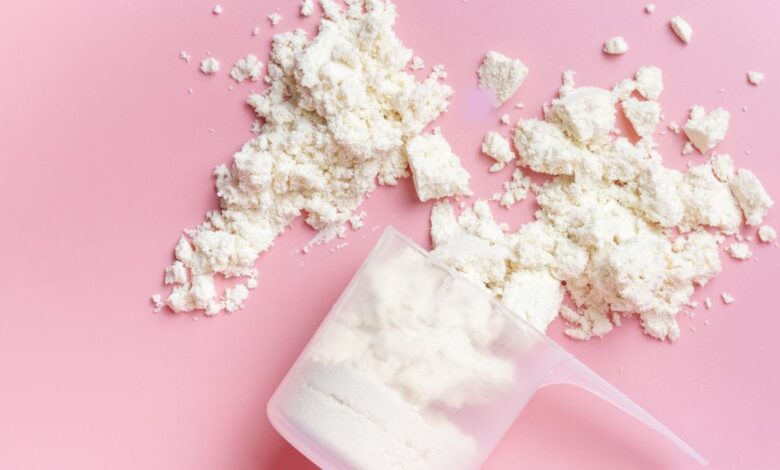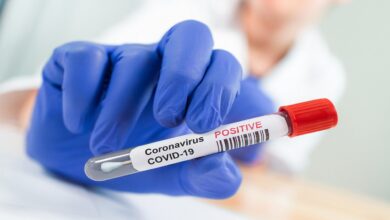What Is Dry Scooping – Pre-Workout Supplement TikTok Trend Dangers and Risks

- Dry scooping has taken over social feeds for the better half of 2021, with fitness enthusiasts deliberately swallowing powdery pre-workout supplements for purported energy boosts.
- Fitness experts say there isn’t any benefit to skipping water when preparing pre-workout supplements, and that dry scooping can lead to a myriad of health risks — mostly overdosing on key ingredients like caffeine.
- One 20-year-old woman ended up in the hospital after a sustained heart attack following a dry scoop attempt, leading to increased scrutiny on the trend.
If there’s one trend that’s refused to end this year, it’s the TikTok-fueled obsession with dry scooping amid fitness enthusiasts. Believe it or not, despite rocketing to popularity over the last few months via a myriad of social channels, dry scooping has been percolating among gyms for many years — even as fitness experts have remained mystified as to why some continue to consume supplements this way.
This year’s uptick in dry scooping doesn’t have to do with cooldowns or post-gym recovery treatments, but rather has social media users focused on their pre-sweat routine. The supplements in question are usually those sold as pre-workout powders that promise users a boost in energy and cognitive commitment, making a hard workout session that much easier. While these pre-workout supplements often pack in a few ingredients that may potentially impact your stamina in the gym — mainly, caffeine and some form of vitamins, depending on the blend — they’re intended to be mixed with liquids for safe consumption.
Fans of dry scooping, however, often ignore the supplement’s manufacturers’ directions and try to intensify supposed benefits by swallowing the bulk powder on its own.
What is dry scooping on TikTok?
Put simply, TikTok users are dry scooping by purposefully taking various amounts of measured pre-workout supplements and dumping them into their mouths; some may attempt to swallow this powder alone before chasing it, so to speak, with water or another liquid of their choice. Brad Dieter, Ph.D., a National Academy of Sports Medicine-certified nutrition coach, explains that pre-workout supplements are intended to be mixed with much more water than just a few mouthfuls.
Often, especially for newcomers to the trend (including the TikTok user below!), there are ties drawn between dry scooping and the cinnamon challenge, a now-forgotten social-driven trend that surged in the early 2010s.
This content is imported from TikTok. You may be able to find the same content in another format, or you may be able to find more information, at their web site.
“[Dry scooping] is something that people have done for decades… and just now that you have things like TikTok, more people are exposed to it,” Dieter adds. “It’s pretty difficult to actually do; you end up having to drink quite a bit of water to get it all down, or it ends up in your sinus cavities because it gets stuck in your soft palate. You’re trying to swallow [powder] and it usually just doesn’t work very well.”
There are usually clear dosing instructions for most pre-workout supplements: A ratio of powder to water for safe consumption, depending on the product’s ingredient list. Dry scoopers have long purported that they’re purportedly maximizing their boost by skipping diluting their supplement with water, Dieter says.
What is the point of dry scooping?
There are countless TikTok declarations and seemingly endless Reddit comments on accounts of those who swear by the added energy boost they purportedly enjoy by eating pre-workout supplements on their own. But you’d be hard-pressed to find documented increased benefits of ingesting the dry powder over mixing it according to manufacturers’ instructions, Dieter says.
“I wouldn’t say there are any benefits to doing it this way. I think it’s just extreme people like to do extreme things; it’s entertaining,” he adds. “At least, that’s how it was when people first started dry scooping… It wasn’t really like a convenience thing, or more effective, it was just a ‘funny’ thing for people to do.”
Normally, pre-workout powder supplements purchased from reputable retailers are safe to use when following dosing recommendations and other instructions. But experts like Dieter are concerned because these supplements, like many others on the open market, aren’t regulated by the U.S. Food and Drug Administration — and raw ingredients can include under-the-radar additions that shoppers may not know about. Previous research into weight loss supplements, specifically, found trace amounts of banned stimulants, for example.
Some social users have picked up on the fact that there’s little to no support for dry scooping over simply preparing pre-workout supplements as intended.
This content is imported from TikTok. You may be able to find the same content in another format, or you may be able to find more information, at their web site.
Is dry scooping effective?
Both those who prefer dry scooping and those who prepare a pre-workout supplement with water properly describe feeling a major rush in energy and psychological stamina. That boost often has to do with the kinds of ingredients one finds in any chosen pre-workout supplement — but Dieter says nearly all involve a significant amount of caffeine.
Ingredients can vastly range between products, but these three common additions to pre-workout powders may be the source of any impact on your energy:
- Beta-alanine: This is an amino acid that’s produced naturally within the body, helping to create a compound known as carnosine, which can increase your endurance across muscle groups during high-intensity exercise.
- Vasodilators: These kinds of added supplements help to increase blood flow during your workout, and are often used in part to treat things like high blood pressure out of the gym, per Mayo Clinic experts. The most common is L-arginine, an amino acid that is found in protein-rich foods and may also be used in erectile dysfunction treatments, for example.
- Other nitric oxide boosters: Nitric oxide is a naturally occurring compound that also impacts your circulatory system, but supplement manufacturers often rely on other vasodilators like L-citrulline to help stimulate this compound after consumption. Research is limited on the benefits of nitric oxide in physical performance, but one piece of evidence suggests supplements with L-citrulline and other vasodilators can increase the amount of nutrients transported to muscle groups. “All these things kind of just allow for greater blood flow to muscle tissue,” Dieter adds.
Because research is limited, fitness and sports medicine experts often attribute energy boosts associated with pre-workout supplements to controlled amounts of caffeine. Caffeine has been documented to potentially increase exercise capacity in training sessions, but the key here is controlling the amount of caffeine in play. “150 to 300 milligrams for most people is more than enough; that’s a 16oz to 20oz cup of Starbucks coffee, in that range,” Dieter explains. Other ingredients in pre-workout supplements, including Beta-alanine, aren’t known to give you a direct, acute improvement in the moment: “It takes about four to six weeks of taking it daily to have any effect,” he adds.
But any benefits associated with pre-workout supplements have been gleaned from individuals who follow dosing and preparation instructions closely — not those who dry scoop. There is no documented benefit to consuming pre-workout supplements dry, as liquids aren’t hampering the quality or potency of the ingredients within the chalky mix. Dry scooping, in particular, may innocuously lead to overdosing on certain ingredients; and since caffeine plays such a big role in most products, this is where things can get dangerous.
Is dry scooping bad for your heart?
Some social users are questioning the necessity of dry scooping following a highly-publicized story of a 20-year-old TikTok user who ended up in the emergency room after giving the trend a try. Buzzfeed reported that the woman in question, Briatney Portillo, began to feel “tingly and itchy” across her body before experiencing chest pain that turned into nausea and lightheadedness. “Then my chest pain came back and this time it was more intense… The pain went to my back and to my left arm, and my left arm went slightly limp, so I knew those were symptoms of a heart attack,” Portillo said.
Doctors concluded that it was a non-ST segment elevation myocardial infarction, otherwise known as NSTEMI; this kind of heart attack is less damaging to your heart because arteries aren’t entirely sealed, per Johns Hopkins University medical research. The cause of the heart attack likely had to do with a caffeine overdose: Depending on what you eat and drink earlier in the day before a workout (or afterward as well), caffeine can be extremely dangerous once certain overdosing thresholds have been reached, Dieter explains.
Too much caffeine can lead to things like an elevated heart rate, gastrointestinal discomfort, or disruptions to your sleep, and other jitteriness. An overdose, on the other hand, can lead to many of the symptoms Portillo reportedly experienced — things like heart palpitations, lightheadedness, respiratory failure, and chest pain. And while it may sound rare, anything beyond 400mg of caffeine each day can prompt your body to react this way; a few cups of coffee in the morning and anything more than one to two dry scoops of pre-workout could be more than enough.
Risks are especially apparent for those with underlying conditions or other medications at play, including blood thinners to medications like Ritalin or other weight loss supplements, Dieter says. “A lot of the time, the people who [dry scoop] sometimes also take additional things like anabolic steroids, thyroid hormone for weight loss, or thermogenic supplements — all of which can have some side effects,” he adds. “Combined with pretty high levels of caffeine or any of the other things in those pre-workouts, [dry scooping] can definitely increase your risk for an adverse event.”
Other adverse events include things like overdosing on Beta-alanine, which can lead to an unusual sensation called paraesthesia, or tingling all over your skin, Dieter says; too much exposure to vasodilators, although rare, could lead to chronic fluctuating blood pressure issues over time. The risk for permanent damage to your heart health may be low, but dry scooping tends to lead to overconsumption of pre-workout supplements, which is why many fitness experts flag the potential damper it can put on your cardiovascular health.
Plus, as you’ll see across many TikTok videos percolating under the #dryscoop tag, other health risks include choking or respiratory issues as people sputter and cough through chalky powder. There’s also a whole other camp of social media users questioning the effect of dry scooping on teeth – this user recaps concern that the acidic profile of pre-workout supplements can impact your enamel over time.
The bottom line:
There isn’t any proof that dry scooping can lead to a more pronounced boost to your stamina over simply mixing pre-workout supplements with water as intended. “For that reason, I would say, there’s really no need to dry scoop — taking the supplement as directed, diluting them in water and drinking them, is generally a much more efficient approach over the long run, while making sure you’re very mindful of the dosages,” Dieter adds.
Because these kinds of supplements aren’t regulated by FDA legislature, there is some risk associated with pre-workout supplements beyond dry scooping. Choosing a product from a reputable retailer with physical locations as opposed to online, for example, can often reduce the risk that you’re pulling a product that is oversaturated in caffeine, for example.
Editor’s Note: Since these ingredients can crucially impact individuals with pre-existing conditions or those taking other medications, it’s essential that you talk about pre-workout supplements with your primary healthcare provider — especially if you think dry scooping is necessary for your fitness routine. The best way to reduce risk as much as possible is to follow the manufacturer’s instructions for dosing and dilution, meaning mixing your choice of powder into water to enjoy it prior to your workout.
This content is imported from {embed-name}. You may be able to find the same content in another format, or you may be able to find more information, at their web site.
This content is created and maintained by a third party, and imported onto this page to help users provide their email addresses. You may be able to find more information about this and similar content at piano.io
Source link




